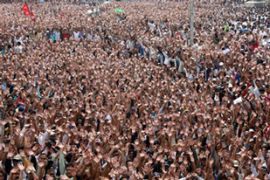Maoist strike sparks Nepal anger
Police fire warning shots as thousands rally in capital against nationwide shutdown.

The protesters called for the government and Maoists to resolve their differences and finally reach a peace agreement.
The Maoists, who hold about 40 per cent of seats in the 601-seat parliament, are pushing for the formation of a new national unity government under their own administration.
Experts said the group is enforcing the strike as a pressure tactic to return to power, which threatens Nepal’s fragile peace process.
Consensus urged
Al Jazeera’s Subina Shrestha, reporting from Kathmandu, said that Friday’s protests turned “violent when Maoists tried to stop people from attending the rally”.
|
“Medical care has been badly affected. We have had reports of patients being transported back to their homes in wheelchairs” Gauri Pradhan, spokesperson of the National Human Rights Commission |
“The police were charging batons, shooting in the air and using tear gas shells in an effort to stop them [Maoists].”
At least five people were also wounded in the western town of Lekhnath, about 200km west of Kathmandu, when violence erupted over the strike.
Since Sunday, Maoists have forced private and commercial vehicles off the streets and all schools, shops, offices and businesses to remain closed.
Kush Kumar Joshi, the president of the Federation of Nepalese Chamber of Commerce and Industry, said: “We have given the political parties and the Maoists a two-day deadline to come to a consensus and end the strike.
“The strikes have been crippling the business industry and all sectors have been adversely affected. Nepal is losing $30m everyday.”
Ordinary Nepalis said they are being hurt by the strike and consumer groups said food was running low and prices had risen.
Madan Krishna, a local celebrity who attended the rally, said that the weekend deadline was too long to wait for.
“Two days is too long when people are suffering from the scarcity of foodstuffs like rice, lentils and vegetables,” he said.
The National Human Rights Commission, an autonomous official body, expressed concern over the increasing problems facing the public.
“Medical care has been badly affected. We have had reports of patients being transported back to their homes in wheelchairs,” Gauri Pradhan, the commission’s spokesman, said.
“Pregnant women have difficulty getting to hospital. Remote areas are facing acute shortage of essential drugs because transport is affected,” she added.
Maoist challenge
The Maoists have launched their challenge to the government – a loose coalition of 20 parties – ahead of May 28 when a new national constitution will be drafted.
But legislators are expected to miss the deadline, leading to a possible political crisis.
“The prime minister needs to step down, and all parties must reach an agreement on how to move forward,” Lok Raj Baral, chairman of the Nepal Centre of Contemporary Studies, a pro-democracy think tank, said.
“They must not forget that the constitution still needs to be written and the peace process brought back on track.”
But the government has said it will not bow to the Maoists’ demands.
The unrest has raised fears of renewed bloodshed in the country, where Maoists guerrillas fought a decade-long insurgency against the state, which left thousands of people dead, before a peace deal was signed in 2006.
The left-wing group then won elections in 2008 before falling from power last year.